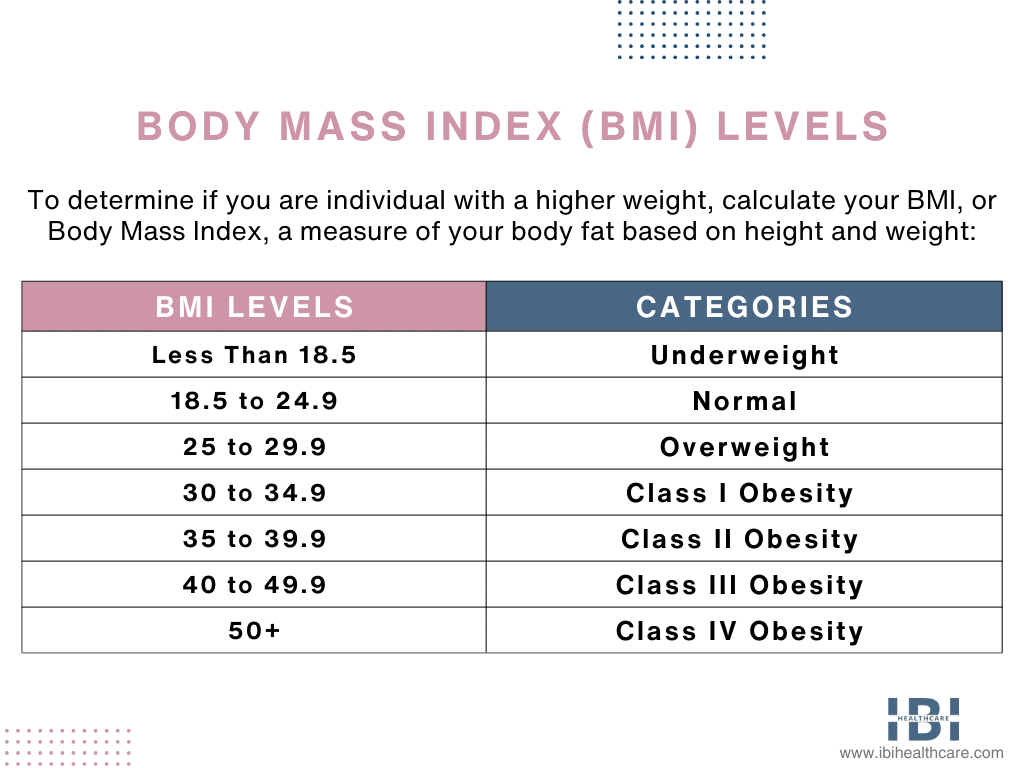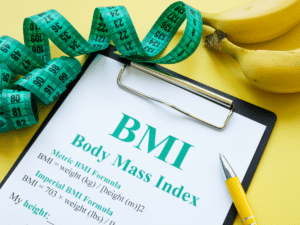Believe it or not, a survey conducted in the UK revealed that only about 10% of the higher-weight population realizes that they are higher-weight. Even more concerning is that most of these higher-weight individuals do not understand the health dangers that obesity brings with it.
You may be thinking, do they not know they are of higher weight? Could they be in denial because the reality is just too overwhelming? It could be either of these or perhaps they just never thought about it before.
Could you be one of these individuals? This may be a touchy subject for some, but here at IBI Healthcare Institute, we care about you and your health and are here to help you.
Today we are going to talk about obesity, how it can affect your health, ways to determine if you are higher weight, how to find out how many pounds higher weight you are using an excess body weight calculator, and what options are available to you to correct it.
What is the Difference Between Being Higher Weight and Obesity?
Individuals who weigh higher have a higher body fat percentage and weigh more than what is considered normal or desirable for their frame and gender.
When an individual has an excessive accumulation of fat on their body that begins to impair their physical health, causing damage to internal organs, joints, muscles, and other areas of the body, they are considered to be at a higher weight.
Excess weight of 100 pounds or more may lead to life-threatening conditions, such as type 2 diabetes and high blood pressure, which earns an individual the label of class III obesity. Indeed, obesity is responsible for the 2nd highest number of premature deaths in the world, only outranked by smoking.
Five Questions You Can Ask Yourself to Identify Obesity
Here are five questions you can ask yourself to help determine if you may be suffering from obesity.
1. How Big is Your Waist?
A waist circumference of more than 35 inches for a woman or more than 40 inches for a man may indicate that you are of higher weight. Visceral fat is the type of fat that tends to accumulate around our midsections, can wrap around our internal organs, and is the kind we refer to as “bad fat”. It can increase your risk for heart disease, type 2 diabetes, high cholesterol, Alzheimer’s, stroke, etc.
Measuring your waist circumference can help determine if you may have excess visceral fat. This does not necessarily identify obesity however, it may be an indication of ill health. To measure your waist, place a tape measure at the halfway point between the bottom of your ribs and the top of your hips and wrap it around your body just above your belly button. The tape measure should be taut but not digging into the skin. Breathe out naturally and measure.
2. Do you Snore?
Snoring is a common sign of being higher weight. The fat in the neck can partially block the airway and induce snoring. Fat centralized around the belly and chest can also promote snoring because it raises the diaphragm, restricts the rib cage, and reduces the size of the lungs. Reducing the capacity in the lower lungs restricts the airflow needed to support the neck and windpipe.
3. Do you experience Chronic Heartburn?
Gastroesophageal reflux disease, also known as GERD can be another indication of being higher weight. It occurs when acid from the stomach flows into the esophagus and most often occurs a short time after eating and lasting for a few minutes or hours. There may also be a burning sensation in the throat or chest, a bitter or sour taste in the mouth, or a cough.
The risk of GERD seems to be higher for women and in the caucasian population than in men or other ethnicities. Excess belly fat, a hiatal hernia, and changes in hormone levels can all exacerbate GERD. Chronic heartburn caused by the reflux of acid into the esophagus can cause complications and even develop into cancer. There are three disorders of the esophagus that are related to obesity: GERD, esophageal adenocarcinoma, and Barrett’s esophagus which is a precursor to cancer. Try out our GERD calculator to calculate your GERD stage and score.
4. Do you always feel Tired?
There is a link between chronic fatigue and obesity and there may be many factors simultaneously at work contributing to the problem.
Pennsylvania State University College of Medicine conducted some research in 2006. It reported the main link between obesity and chronic fatigue was metabolic and psychological factors. Weight-related disorders cause sleep disruptions, which result in fatigue.
Obesity often causes a condition called sleep apnea which happens when breathing is interrupted and abruptly disrupts sleep. Insulin resistance is a condition that is common in higher-weight individuals and can prompt fatigue. Obesity is linked to depression which is a known cause of excessive daytime sleepiness and fatigue.
5. Do your Joints Ache?
Excess body weight has a significant impact on the risk of developing arthritis. Being a higher weight increases the risk of experiencing joint disease. As it puts a degree of weight and stress on joints that they were not meant to withstand (knees, back, and feet). Excess weight also causes inflammation and swelling which can be painful and impact mobility.
What is BMI and Why is it Important?
Healthcare professionals often employ the BMI scale, utilizing it as a compelling starting point to evaluate if someone is near or at a healthy weight according to their gender and physique. BMI, meaning body mass index, does not measure a person’s fat percentage accurately nor comprehensively delineate their state of health; nevertheless, the medical realm usually defers to it as a prognostic of possibly weight-related ailments.

*Note: Morbid obesity is no longer widely used; instead, a class system is used. However, references to it can still be found related to obesity.
Using the BMI scale to indicate obesity is not flawless. It does not allow for variations such as differentiating between fat and muscle mass. Most NFL football players do not fall into the “higher weight” category, despite the BMI calculator. It is simply a fast, easy, and inexpensive way to help categorize individuals into weight classes but has limitations.
Excess Weight Calculator
What is an Easy Way to Determine Your Excess Weight?
One way to determine how high weight you are is by using an excess body weight calculator. Your height and weight determine your BMI category, which then identifies your ideal weight. Thus, this calculator helps you easily calculate it.
An excess weight calculator can provide you with your “ideal weight,” and weight loss projections. Additionally, it will show you how much weight to lose. The excess weight loss calculator will include projected weight loss results for 3 months, 6 months, and 1 year post-procedure. Calculate your potential weight loss using the excess body weight calculator after considering various weight loss procedures. Try out our BMI calculator to determine excess weight loss.
An expert in bariatrics and obesity can provide the most accurate projection of weight loss. Although a BMI calculator can yield an overall idea of one’s weight situation and various weight loss choices. To better assess, employ the advice of a specialist. Sometimes determining obesity means asking “the hard” questions. Once you’ve asked yourself these questions, we’ll provide you with answers and options.
We understand the difficulty of weight loss, so let us assist you on your journey. Our institute offers support to help make the process easier. We are here to provide guidance and support to help you reach your weight loss goals. Contact us today to set up an appointment to learn more about your options for weight loss.











